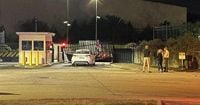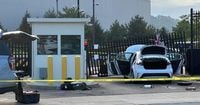In the early hours of September 17, 2025, the quiet streets of Pittsburgh’s South Side were shattered by the screech of tires and the crash of metal as a white Toyota sedan rammed the entrance gate of the FBI’s field office. The driver, later identified as Donald Henson of Penn Hills, set off a chain of events that would spark alarm, confusion, and a rapid federal response. What unfolded in those hours—and the days since—has raised difficult questions about security, mental health, and the pressures facing both law enforcement and veterans.
According to the New York Times and multiple local outlets, it was around 2:40 a.m. when Henson, reportedly accelerating, slammed his car into the reinforced metal gate at the FBI compound on the 3300 block of East Carson Street. The impact left the gate twisted and the car’s driver-side door ajar, hazard lights blinking in the night. Surveillance footage and eyewitness accounts, as reported by ABC News and Fox News, captured Henson calmly exiting the vehicle, retrieving an American flag from the back seat, and draping it over the damaged gate. He then shouted the Latin phrase “sic semper tyrannis”—historically associated with the assassination of Abraham Lincoln—before disappearing into the darkness on foot.
Authorities moved quickly. The FBI’s Special Agent in Charge, Christopher Giordano, told reporters at a morning press conference, “We look at this as an act of terror against the FBI. This was a targeted attack on this building.” Initially, officials did not mince words, calling the incident an “intentional act” and a “targeted attack.” However, as the day progressed and more details emerged, the agency stepped back from the “act of terror” label, acknowledging the complexities of Henson’s motivations and mental state.
No one was injured in the incident, but the consequences could have been far worse. A contracted private security officer was stationed just seven feet from the gate at the time of impact. According to the criminal complaint cited by TribLive, the officer at first thought the crash might have been a medical emergency. But when he saw Henson move to the rear of the car, he feared the driver might be retrieving a weapon and chose not to approach. The crash itself created a gap in the gate, briefly raising the possibility that someone could have breached the FBI facility’s security perimeter.
Witnesses in the area, like Nakeisha Brown, described the tense moments after the crash. Speaking to WTAE, she recalled, “I thought it was a gun, but it happened to be a flag and he just set it on that fence and started yelling out some words and just took off.” Others described Henson as appearing incoherent and agitated as he fled.
Authorities launched an hours-long manhunt, using surveillance footage from area businesses to track Henson’s movements. By just before 10:30 a.m., FBI agents had apprehended Henson and taken him into custody. The vehicle, which bore vulgar messages and a possible reference to suicide scrawled on its side, was cleared by a bomb squad as a precaution, but no explosive devices were found.
Henson, a former military member, was quickly charged with two felonies: damaging government property and assaulting, resisting, or impeding certain officers. During his initial appearance before U.S. Magistrate Judge Chris Brown that afternoon, Henson appeared confused and agitated. He told the judge he was an Air Force officer and did not understand the charges against him. “I can’t do this,” he said, attempting to leave the courtroom before being guided back to his seat by law enforcement officers.
Henson’s mental health became a central concern almost immediately. His court-appointed public defender, Sarah Levin, informed the judge that Henson had been receiving treatment at the Veterans Affairs (VA) hospital and had not taken his prescription medications in the last 24 hours. Henson himself told the judge he was being treated by both a physician and a psychiatrist. As TribLive reported, Henson said he had an appointment with Veterans Affairs and questioned the legal nature of the proceedings, stating, “I was advised it was something of a matter that was ceremonious and not legal. If it is, I’m not interested.”
Federal prosecutors argued that Henson posed both a flight risk and a danger to the community, requesting that he remain detained pending trial. The judge agreed, and Henson was ordered held until his next hearing, scheduled for September 22, 2025. As of Wednesday, no private attorney had been listed for Henson in court records.
The investigation quickly revealed that Henson was not a stranger to the FBI. In the weeks before the ramming, he had visited the field office to file a complaint. “We ran down everything that he came down with. It didn’t have a federal nexus,” Giordano explained during his press briefing. The FBI had contacted Henson to inform him that no federal crime had been identified in his complaint. The specifics of his grievance remain unclear, but officials noted that it “didn’t make a whole lot of sense.”
The symbolism of Henson’s actions—the American flag, the shouted Latin phrase, the targeted attack on a federal institution—has not gone unnoticed. Yet, as more details have emerged, the picture has grown more complicated. Bradford Arick, an FBI spokesperson, told The New York Times that Henson is believed to have a history of mental health issues. According to the criminal complaint, his actions created not just property damage but a real security threat to the FBI facility.
While the FBI initially used strong language to describe the event, the agency’s subsequent caution reflects a broader pattern. In recent years, FBI field offices have faced similar attacks from individuals with a range of motivations, including mental health crises. In April 2024, a man rammed his SUV into the Atlanta field office gate and was fined for property destruction. In 2022, officers shot and killed a man attempting to break into the Cincinnati office. And, in July 2016, a dump truck driver crashed through the Pittsburgh gate, causing hundreds of thousands of dollars in damage.
For Pittsburgh, the latest incident is a sobering reminder of the challenges facing law enforcement in an era of heightened tensions and unpredictable threats. It also raises questions about the intersection of mental health, military service, and acts of public disruption. As the investigation continues and Henson awaits his next court date, officials are left to balance the need for security with a growing awareness of the complexities that often underlie such attacks.
In the end, the battered gate, the draped flag, and the unanswered questions serve as stark symbols of a nation grappling with both external threats and internal struggles—sometimes, as in Pittsburgh this week, all at once.


